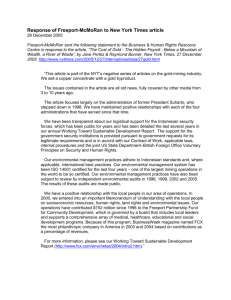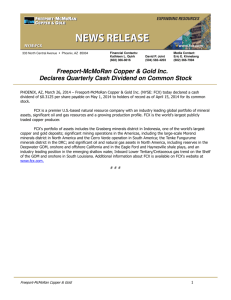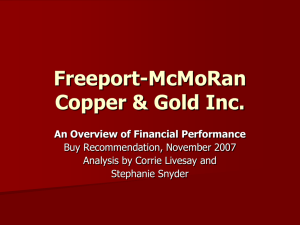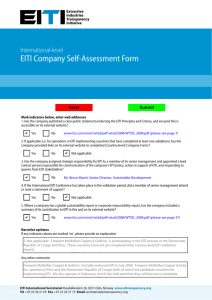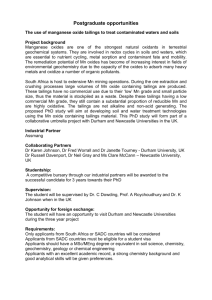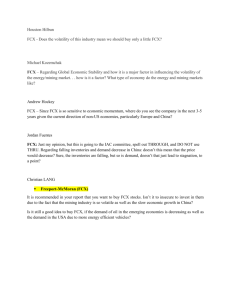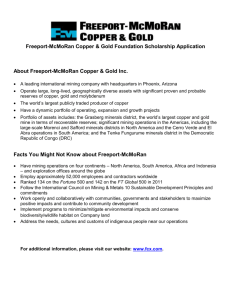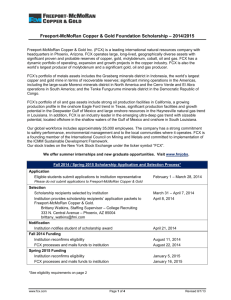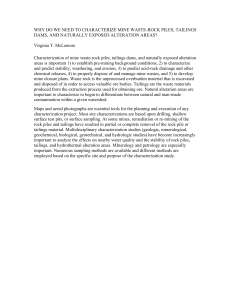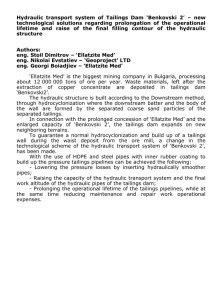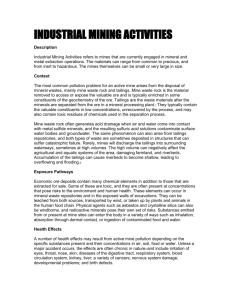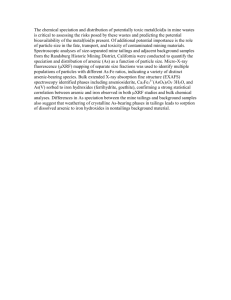Freeport-McMoRan response
advertisement
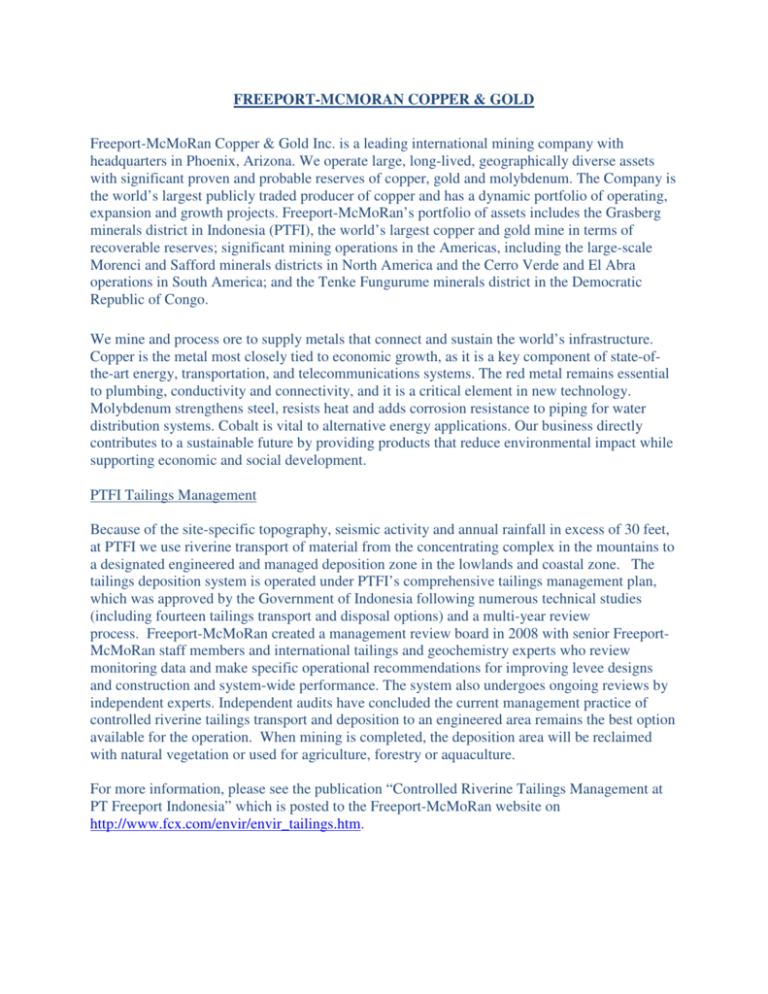
FREEPORT-MCMORAN COPPER & GOLD Freeport-McMoRan Copper & Gold Inc. is a leading international mining company with headquarters in Phoenix, Arizona. We operate large, long-lived, geographically diverse assets with significant proven and probable reserves of copper, gold and molybdenum. The Company is the world’s largest publicly traded producer of copper and has a dynamic portfolio of operating, expansion and growth projects. Freeport-McMoRan’s portfolio of assets includes the Grasberg minerals district in Indonesia (PTFI), the world’s largest copper and gold mine in terms of recoverable reserves; significant mining operations in the Americas, including the large-scale Morenci and Safford minerals districts in North America and the Cerro Verde and El Abra operations in South America; and the Tenke Fungurume minerals district in the Democratic Republic of Congo. We mine and process ore to supply metals that connect and sustain the world’s infrastructure. Copper is the metal most closely tied to economic growth, as it is a key component of state-ofthe-art energy, transportation, and telecommunications systems. The red metal remains essential to plumbing, conductivity and connectivity, and it is a critical element in new technology. Molybdenum strengthens steel, resists heat and adds corrosion resistance to piping for water distribution systems. Cobalt is vital to alternative energy applications. Our business directly contributes to a sustainable future by providing products that reduce environmental impact while supporting economic and social development. PTFI Tailings Management Because of the site-specific topography, seismic activity and annual rainfall in excess of 30 feet, at PTFI we use riverine transport of material from the concentrating complex in the mountains to a designated engineered and managed deposition zone in the lowlands and coastal zone. The tailings deposition system is operated under PTFI’s comprehensive tailings management plan, which was approved by the Government of Indonesia following numerous technical studies (including fourteen tailings transport and disposal options) and a multi-year review process. Freeport-McMoRan created a management review board in 2008 with senior FreeportMcMoRan staff members and international tailings and geochemistry experts who review monitoring data and make specific operational recommendations for improving levee designs and construction and system-wide performance. The system also undergoes ongoing reviews by independent experts. Independent audits have concluded the current management practice of controlled riverine tailings transport and deposition to an engineered area remains the best option available for the operation. When mining is completed, the deposition area will be reclaimed with natural vegetation or used for agriculture, forestry or aquaculture. For more information, please see the publication “Controlled Riverine Tailings Management at PT Freeport Indonesia” which is posted to the Freeport-McMoRan website on http://www.fcx.com/envir/envir_tailings.htm. Human Rights Freeport-McMoRan condemns human rights violations of any form. We have a longstanding commitment to the protection of human rights and have been vigorous in communicating, enacting and enforcing our Human Rights Policy. Initially adopted in 1999, the Policy requires that we recognize and respect human rights and conduct business in a manner consistent with the Universal Declaration of Human Rights, educate our employees and protect any employee who reports suspected violations. It requires fair treatment and work conditions for all employees, including rights to freedom of association and collective bargaining, and prohibits forced, compulsory, and child labor. (www.fcx.com/envir/pdf/policies/2009/HumanRightsPolicyBoard%20_3Feb09.pdf) Freeport-McMoRan has been a member of the Voluntary Principles on Security and Human Rights (“Voluntary Principles”) since it was first established in 2000. The Voluntary Principles have been an important cornerstone of our human rights and security program, providing guidance for our operations as well as a mechanism to promote engagement, awareness, and respect for human rights within our employee base as well as with our government and community partners. Each year, participants in this program meet to review implementation of the principles and to seek better ways to provide security for extractive industry operations around the world to protect employees and investments while assuring the highest level of human rights compliance. We post our annual Voluntary Principles on Security and Human Rights Report for stakeholders to understand our programs and performance, particularly at PTFI. The report includes a description of our extensive outreach and training on the Voluntary Principles with host government security. (www.fcx.com/envir/pdf/policies/FCX_Volun_Princi_Plen_Report_21_Feb_2011_final.pdf Community Development Freeport-McMoRan operates around the globe, but each of our operations is rooted in local communities where the people we employ, suppliers we choose, and organizations with which we partner are all integral to the success and development of the area. In alignment with our Community Policy, we work collaboratively with communities to mitigate negative impacts and cultivate opportunities to maximize positive impacts, as well as advance local community development plans. Through community engagement, cultural preservation projects, and training and development programs we specifically seek to address the needs, cultures and customs of indigenous peoples near our operations. PTFI is committed to sustainable social and economic development in Papua Province. For example, PTFI has invested approximately US$6.6 billion in infrastructure in Papua, including two major towns, power plants, airports, seaport, roads, bridges, waste disposal facilities, and a modern communication system. In 1996, PTFI established the Freeport Partnership Fund for Community Development (the Partnership Fund), through which PTFI has made available funding and technical assistance to support the economic, health, education and social development of the area. PTFI has committed through 2011 to provide one percent of its annual revenue for the development of the local people in its area of operation through the Partnership Fund. In 2010 alone, PTFI invested more than US$137 million in various sustainable development programs in Papua. US$64 million of this sum was dedicated specifically to community development programs by way of the Partnership Fund. Social infrastructure provided by the company includes schools, dormitories, hospitals and clinics, places of worship, recreational facilities, and small and medium enterprise development. PTFI has also sought to improve the economic status of the local population by increasing their skills through extensive training programs so they can be integrated into the workforce. These programs have been quite successful and, at the end of 2010, approximately 28 percent of PTFI’s 22,500 member workforce was Papuan (which is more than twice the original local population level of the entire region when mining began). Freeport-McMoRan’s annual Working Toward Sustainable Development Report and Supplement, prepared at the A level of the Global Reporting Initiative and independently assured, (www.fcx.com/envir/wtsd/pdf-wtsd/2010/WTSD_Bk_2010.pdf and www.fcx.com/envir/wtsd/pdf-wtsd/2010/WTSD_Bk_2010_supplement.pdf ) are our primary sustainability reports which cover key sustainability challenges and performance. In these documents, stakeholders can find much more information on our sustainable development programs and impacts at PTFI.
